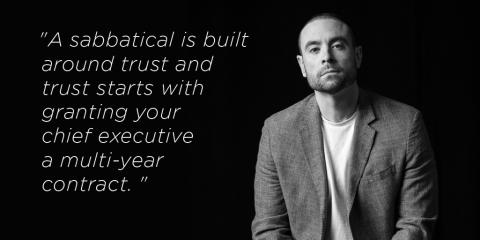Executive Director Blog Series No. 2: Academy Center of the Arts
A sabbatical is built around trust, and trust starts with granting your chief executive a multi-year contract.
The first question I am going to ask our readers: if you are a nonprofit executive, do you have a multi-year employment contract? Not just an employment agreement, but a multi-year contract?
The next question I will ask is this: if you are a board member of a nonprofit, why are you not providing your executive with a multi-year contract? If you are an executive, why aren’t you asking for one?
Commitment can be hard. But, commitment is also critical in building a culture of trust.
In 2017, after working for the Academy for two years, I asked for a multi-year contract. At the time, our Board President was Sackett Wood, and I was lucky enough that Sackett understood why this was important. Not just important to me (which it is, and I will speak more to that in a moment) but because it was important in changing the culture within the Academy. We needed to believe, and belief comes from trust.
For years, the organization was weighed down by doubt and anxiety. In reference to our multi-million dollar Historic Theatre restoration project, it was common to hear, “That will never get done,” or, “That organization is a mess!”
To break this narrative, there had to be a change, and change comes with taking risks. Risk is scary, and to face that fear, you must have belief in yourself and in those you work with. The organization’s commitment to my leadership signaled to me that my organization believed in me and in turn, I should believe in the organization. Wouldn’t any organization and its leadership want this?
Now, commitment can be terrifying. What if we make a bad hire? What if I picked the wrong job? A multi-year contract can be broken if a leader should legitimately be terminated (which absolutely happens) but the contract makes it hard to terminate an executive, as it should be, because an unplanned leadership change can be traumatic for an organization. A contract also signals to the organization that the executive is committed to the job. This is important for stability in regards to fundraising, board and staff morale, strategic planning, and execution.
The beauty of nonprofit management is that it involves governance from a board of directors and if structured correctly, a contract can make sure there has to be a majority board consensus to remove an executive. This elevates the commitment of the executive to the organization and the organization to the executive. It can also establish clear protocols for an executive’s exit, which is crucial in protecting all parties involved.
In 2016, a good friend of mine was the Executive Director of a major art museum in a large southern city. My friend delves publicly into politics more than I personally do, and because of this, she ran into a conflict with her new Board President. She didn’t have a multi-year contract, and no board policy required a board majority vote for her termination. The new Board President assembled a small group privately and terminated my friend without board consensus. This was obviously horrible for my friend, but it was also terrible for the organization as a whole.
It was all over the news, and it rippled throughout the community. As a result, board members resigned, major donors pulled funds, and the organization still hasn’t fully recovered.
What does this have to do with my sabbatical? Well, I don’t think a sabbatical happens without a culture of trust. In addition to that, an executive contract was both the delivery system of the sabbatical and also created the culture that made it feasible.
To begin, my organization granted me a sabbatical in my latest contract because they trust me. I am willing to take this sabbatical because I trust them, both the staff and the board. This trust stems from that original contract plus seven years of leadership during challenging times, bolstered by belief in one another. All of this trust is rooted in a commitment to leadership. So, grant your executive leader a multi-year contract.
Now, trust is great, but we don’t keep that trust if we don’t have a plan. This is where distributed leadership comes into play within our planning. To accomplish the three-month absence of a chief executive, responsibilities and workload have to be re-distributed to the staff and the board with specificity. This is why planning for this sabbatical began in January; it is comprehensive, involving deep board engagement and new leadership roles within the staff.
None of this would have been possible with the 2015 version of the Academy. It took us years of establishing trust, not just internally, but externally. We went from, “That will never get done” and “That organization is a mess!” to a belief that we can be trusted to handle a huge decision, one like an executive sabbatical.
Next month, as I get ready to briefly step away, I am going to focus my blog post on the nitty-gritty of the distributed leadership plan. I will share in detail how we are re-assigning my roles and workload throughout the organization. I will also pose how this approach might be applied in other organizations. I got feedback that people wonder how this could be done with a smaller staff, or in a situation where an executive is the only staff member, and I will tackle this as well.
I again want to thank SHARE Greater Lynchburg for this platform to discuss this process. I was overwhelmed by all of the positive feedback I received in the last few weeks. It confirmed the importance of “sharing” as well as the basis for the Greater Lynchburg Community Foundation’s commitment to connectivity across our sector.
Until next time…
Geoffrey Kershner
Chief Executive Officer
Academy Center of the Arts



